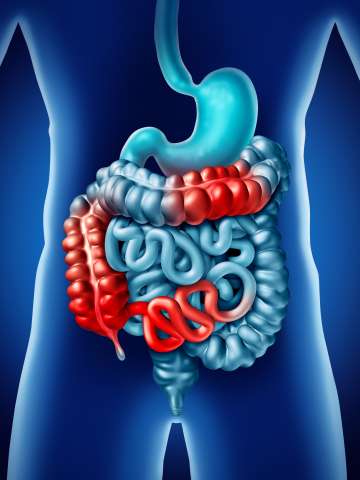Inflammatory Bowel Diseases (IBD)
Our team offers comprehensive therapeutic and holistic care for ulcerative colitis and Crohn’s disease with the goal of remission and improved quality of life.

Why choose UCLA Health for inflammatory bowel disease care?
Our experts are committed to delivering the best-quality care for individuals with inflammatory bowel diseases (IBD), including Crohn’s disease and ulcerative colitis. Our priority is to serve patients at every life stage and provide a space where all IBD care needs can be addressed. We focus on relieving physical symptoms as well as the emotional distress and other challenges that often go hand-in-hand with IBD. Highlights of our program include:
Team approach to IBD care: The UCLA Center for Inflammatory Bowel Diseases offers comprehensive clinical care. Our team includes expert adult and pediatric IBD clinicians, colorectal surgeons, GI dietitians, GI health psychologists and integrative practitioners. We meet regularly to discuss your care, and we work together to develop individualized treatment plans. You are also an essential part of the team, and we encourage shared decision-making that matches your personal preferences.
Second opinions: The IBD center also offers second-opinion consultations to gastroenterologists for their complex IBD patients. Given the center’s vast experience treating IBD and the multitude of subspecialists — including IBD specific gastroenterologists, dietitians, psychologists, social workers, and surgeons — the center can serve as an invaluable referral resource for community physicians.
Specialty clinics: Given the complexity of IBD care, the center has established clinics where dedicated providers with expertise in subspecialty areas are able to offer more nuanced treatment.
LGBTQIA+ population: The center is attuned to the specific needs of the LGBTQIA+ population — including those who are receiving hormones for gender-affirming care, which can potentially interact with certain IBD medications. We provide a welcoming environment as well as high-quality, individualized care in partnership with your primary care provider. For all patients, a GI psychologist and integrative care nurse practitioner help to optimize wellness.
Convenient locations and telehealth: The center’s IBD clinicians are highly collaborative and provide coordinated care for Crohn’s disease and ulcerative colitis across the metropolitan area. Our infusion centers are located throughout Los Angeles and its surrounding communities. Telehealth visits are also available for convenient and accessible care.
Clinical trials and research: Our internationally renowned experts established the UCLA Inflammatory Bowel Disease Research Center to study the cause of IBD and to develop new treatments. We integrate our latest discoveries into the care of our patients. Patients also have access to clinical trials and studies.
Specialty clinics
IBD Medical-Surgery Clinic: If the need for surgery arises, we offer a single-setting clinic that can address all your surgery-related needs. Your IBD physician and the surgical team work in tandem to address issues such as medical and nutritional optimization prior to the surgery, surgical planning, and post-surgical management. You will continue to visit the clinic both before and after the surgery to ensure optimal outcomes.
IBD Nutrition Clinic: Nutrition has become an increasing focus in the management of inflammatory bowel disease. This multidisciplinary clinic incorporates the latest evidence in making dietary recommendations personalized to each patient’s needs. The clinic includes your physician and a team of specially trained IBD registered dietitians who also assist with perioperative nutrition planning to optimize surgical outcomes.
IBD Pediatric-to-Adult Transition Clinic: As children with IBD enter adulthood, a smooth transition out of the pediatric setting is especially important — both to ensure effective continuity of care as they begin to see new providers, and to empower them to take ownership of their ongoing healthcare needs. The pediatric and adult IBD specialists in this clinic focus on patients roughly in the age range of 18 to 26.
IBD Preconception, Pregnancy, and Postpartum Clinic: This multidisciplinary clinic is one of only a handful in the world — in which a team that includes an IBD physician specializing in women’s health as well as a high-risk OB-GYN collaborates with patients through preconception planning, pregnancy, and the postpartum period to alleviate fears, dispel misconceptions, and maximize outcomes.
Our areas of care
IBD can cause major lifestyle disruptions. The symptoms tend to be highly unpredictable. Without treatment, symptoms can progress. In some cases, they can require surgery. We offer:
Comprehensive evaluations and medical management
Our team offers comprehensive evaluations to determine the best medical management plan. We work with you to find the right medications, and we monitor you closely for signs of flare-ups.
Endoscopic screening, surveillance and treatment
With IBD, endoscopy is critical for work-up and regular surveillance. Endoscopy procedures use a small, thin tube inserted into the body, usually through the mouth or rectum. The tube has a camera and tiny tools.
Our gastroenterologists are experts in performing endoscopic procedures to monitor and assess the health of your digestive tract. We use:
Capsule endoscopy (PillCam™): This procedure uses a pill-sized camera that fits inside a capsule to take pictures of the small intestine.
Chromoendoscopy: This test involves spraying a dye onto the lining of the GI tract during an endoscopy to aid in identifying precancerous or cancerous cells.
Colonoscopy: This examination of the large intestine (colon) and rectum checks for abnormalities or changes such as growths in your intestinal lining (polyps). It helps physicians detect and remove colon and rectal polyps before they become cancer.
Enteroscopy: This endoscopic evaluation of the small bowel uses specialized endoscopes.
Sigmoidoscopy: This test examines the rectum and the lower portion of the large intestine (sigmoid colon). It helps your provider check for polyps, ulcers or other irregular cells.
Upper GI endoscopy: This procedure evaluates the stomach, esophagus and the first part of your small intestine (duodenum). We may use this test to diagnose the cause of abdominal pain, difficulty swallowing or gastrointestinal bleeding.
Nutrition and wellness
A unique component of IBD care at UCLA Health is the participation of GI dietitians, GI health psychologists and integrative health practitioners. Offering alternative therapies, our highly experienced team helps you deal with the challenges of living with IBD.
IBD conditions we treat
At the UCLA Health Center for Inflammatory Bowel Diseases, we have experience treating even the most complex types of IBD. These diseases cause chronic (long-term) inflammation and pain in the digestive tract. People with IBD may also have:
- Abdominal cramps
- Diarrhea, bloody diarrhea or bloody stools
- Fatigue
- Redness and pain in the eyes
- Skin problems, such as itchiness
- Swelling in the joints
- Weight loss
Our experts specialize in treating the main types of IBD:
Crohn’s disease: This type of IBD can appear anywhere along the digestive tract. It usually causes pain and inflammation in the intestines.
Ulcerative colitis (UC): UC causes ulcers to develop in the large intestine, leading to swelling and pain.
IBD treatments we offer
With IBD, it’s extremely important to start treatments as early as possible. We offer:
Medications and IBD infusion therapy
Our team works closely with you to determine the most appropriate medications, and monitors your health regularly for signs of flare-ups. Medications may include anti-inflammatory drugs and investigational medications. People with moderate or severe IBD may benefit from regular infusion therapy (medications delivered through an IV).
These treatments are effective at improving symptoms and preventing complications of IBD, such as damage to the intestines. To make care more convenient for you, we offer infusion therapy throughout Southern California.
Nutrition and wellness
People with IBD require specialized nutritional guidance to manage symptoms and prevent malnutrition. Expert nutritional guidance can also address issues that result from changes in anatomy, including strictures, fistulas (abnormal openings along the GI tract) and abscesses (inflamed tissues containing pus).
Anatomy changes can also arise from treatments, such as resection (removing part of the bowel) or other surgeries. Our integrative health care team offers alternative therapies to help you navigate the complexities and stress of living with IBD.
Extraintestinal symptom management
We work with other UCLA Health specialists to help patients with IBD-related health concerns. You receive coordinated care from dermatologists, rheumatologists, OB/GYN specialists, hematologists, ophthalmologists and hepatologists as needed.
Surgery for IBD
If your specialist recommends surgery, you’re in expert hands. Our nationally recognized colorectal surgeons use advanced, minimally invasive surgical techniques, including laparoscopic, robotic and endoscopic surgery. Procedures may include:
Abscess drainage, a procedure to remove pus from an abscess (inflamed tissue)
Endoscopic balloon dilation: This endoscopic procedure treats strictures, the narrowing of the intestines due to inflammation and scarring.
Endoscopic strictureplasty: This endoscopic procedure repairs a stricture by widening the narrowed areas without removing any portion of the intestine.
Ileal pouch anal anastomosis (J-pouch), surgery that allows you to get rid of waste normally after a colectomy
Ostomy (ileostomy or colostomy), surgery that creates an opening (stoma) for waste to exit the body
Partial or total colectomy (bowel resection), procedures to remove part or all of the colon
Seton placement, a procedure that treats a fistula by repairing an abnormal connection in the GI tract
Meet our team
More than most chronic illnesses, inflammatory bowel diseases require a multidisciplinary approach. Our specialists at the UCLA Health Center for Inflammatory Bowel Diseases draw on shared expertise to deliver comprehensive care.
Contact us
Call us at 855-IBD-UCLA () to connect with an IBD expert.
Find your care
Call us at 855-IBD-UCLA () to connect with an IBD specialist.
